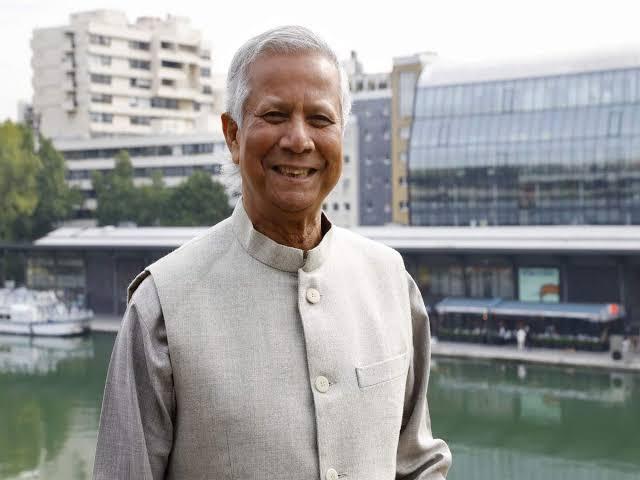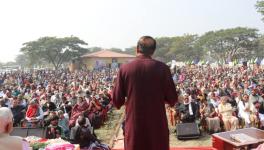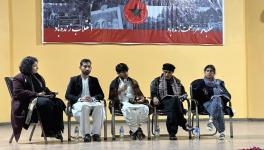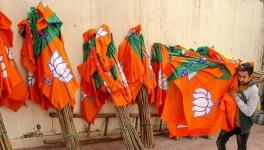Not Distance, but Closeness With New Dhaka Regime Should be India’s Key Strategy

Mohammad Yunus. (File Photo: ET)
Sheikh Hasina, the deposed former Prime Minister of Bangladesh, made repeated complaints while in office that ‘foreign forces’ were trying to topple her government. She raised this issue again before the 12th parliamentary elections held in January this year. In an interview, she hinted that she was offered full assurance of retaining power by a ‘white man’ in a barter deal of allowing the establishment of a military base in St. Martin Island in the north-eastern part of Bangladesh, close to the border with Myanmar. Her party Awami League also alleged a ‘conspiracy' by the US in her ouster.
Notably, Sheikh Hasina raised the issue of “moves by foreign elements” quoting reports of her security advisor, a retired military officer. However, the allegations of conspiracy by Hasina and her party apart, the theory of ‘conspiracy’ gained added significance when Brigadier Sakhawat Hussain (retd), the former election commissioner, who was also appointed as the home affairs advisor of the interim government, stated after a few days of assuming office that the post-mortem report of many of the deceased protesters who had bullet injuries indicated a “mystery” regarding the make of the bullets.
He alleged that the bullets were not the ones usually used by the police or military or any other security agency in Bangladesh and called for an investigation to determine the origin of the bullets as also the users thereof. Surprisingly, Hussain lost his job immediately thereafter, reportedly with a warning by some student leaders that he should refrain from speaking on the issue.
The fact, however, remains that Hussain has been a known critic of the Hasina administration and had fully supported the anti-quota movement leading to the ouster of her government.
Interestingly, the term ‘conspiracy’ gained a new dimension when the new ruler of Bangladesh, Mohammad Yunus, the chief adviser during his first foreign visit to address the session of United Nations General Assembly, attended another meeting hosted by the Clinton Global Initiative and introduced one Mahfuz Alam as the brain behind the whole revolution. He spoke about ‘design’ and ‘conspiracy’ that finally snowballed to the resignation of Sheikh Hasina as Prime Minister and forced her to leave the country. Alam, who was appointed by Yunus as his special adviser, was known for his close proximity to fundamentalist organisations, such as Jamaat-e-Islami and Hizbut Tahrir.
According to a report in The Sunday Guardian, ‘The plan to remove Sheikh Hasina as the Prime Minister of Bangladesh was set in motion in early 2019, documents provided to The Sunday Guardian indicate, and as is being claimed by her, it was executed by government funded agencies operating from the United States. After Mongolia (1996), Haiti (2001) and Uganda (2021), Bangladesh became the latest victory for the US-based International Republican Institute (IRI), which was successfully able to bring about a regime change in Dhaka.’
The report further stated that in March 2019, IRI, after receiving the grant for its activities from USAID and NED (National Endowment for Democracy), started the process of execution of a programme to bring about a regime change in Dhaka. The said programme was named as “Promoting Accountability, Inclusivity, and Resiliency Support Program” (PAIRS) and it ran for 22 months, till January 2021, it added.
The IRI, while talking about its PAIRS programme, stated that the Covid-19 pandemic had the potential for destabilising the Sheikh Hasina government but the lower mortality rate and the successful handling of the challenges for economic recovery despite dire projections came in the way, the report said.
In the report’s assessment, the Bangladesh Nationalist Party (BNP) remained a marginal force and Awami League’s power was still undiminished. However, in their view, BNP stood as the foremost among the forces to drive a power shift in Bangladesh in the future.
Now, the question is, what will India do?
In almost every village or mohalla, there would some persons who are not in the best of terms with their neighbours. Many of them are, for different reasons, famous in the area; some are powerful as well. But their neighbours aren’t bothered, they don’t give undue importance to the so-called fame or might of such persons. India’s relation with its neighbours can be likened to the state of the neighbourhood’s powerful person. But, after the dethroning of Sheikh Hasina, India’s relationship with the only friendly neighbour, Bangladesh, has also become uncertain.
In such an environment, the Indian High Commissioner in Bangladesh, Pranay Verma, held parleys with the leadership of BNP. The secretary general of the party, Mirza Fakhrul Islam Alamgir, complained last month, “India had maintained relations with Sheikh Hasina and her Awami League only. No other country followed the same policy.”
The meeting of Indian High Commissioner with the BNP leadership in the aftermath of this complaint was significant. Mirza Fakhrul stated, “We hope, ice of India’s relation with BNP will now start melting”.
During the previous regime, the complaint about Dakha-New Delhi relationship came from all quarters, starting with the diplomatic, political, teaching community or civil society to even common masses, which felt India maintained relations with only one party, Awami League, or rather to be more specific, with only the one person, i.e. Sheikh Hasina. Keeping all eggs in one basket is not an intelligent proposition. Some critics are also making cryptic remarks that with Awami League becoming almost extinct, India has been forced to extend a toward BNP.
However, the diplomatic efforts made by New Delhi to assuage the hard feelings of the former ruling party in Bangladesh received a setback after a remark made by Union Home Minister Amit Shah. In an electoral campaign in Jharkhand, he said, “Bangladeshi infiltrators will be treated a lesson by hanging them upside down.” Bangladesh government has lodged a strongly-worded protest against the remark.
The situation inside Bangladesh changed overnight after Sheikh Hasina fled. There are reports of alleged onslaughts on Awami League supporters and religious minorities. According to an account of Bangladesh Hindu-Bouddha-Christian Parishad, the largest organisation fighting for the welfare of minorities, in a span of 17 days from August 4-20, there were 2,010 incidents of attacks on minorities. Many minorities fear that Shah’s remark has become a handy tool for these attackers, who may now escalate oppression of minorities in the name of patriotism.
There is no doubt about the presence of Bangladeshi immigrants in India who came through the illegal route. The problem is the absence of exact statistics regarding the magnitude of the infiltration. As a result, politics continue to centre on the issue. Before every election, the ruling Bharatiya Janata Party (BJP) at the Centre flags its opposition to illegal migration by minorities and their appeasement by some political parties. Shah had once even compared Bangladeshi infiltrators with “termites”. The Hasina government then ruling in Bangladesh had registered a mild protest. Hence, it is natural that the language of protest by the government who came to power recently would be stronger.
The government of India needs to initiate steps keeping in mind the changed realities in the neighbouring country. During the Hasina regime, ties between the two countries rose to incredible heights. It will be a challenge to maintain the same after the change of guard in Bangladesh.
After Hasina Left the country, her party has virtually vanished, at least in regular political activities. Awami League leaders have either fled or have gone underground. But, thousands of party supporters are being hammered. Seizing the opportunity of the situation, the BNP has assumed the role of rulers even before formal ascendancy to power and has been hitting the headlines in incidents related to looting, extortion or syndicating.
On the other hand, Nobel laureate Mohammad Yunus, the chief adviser, is allegedly taking some steps that could endanger not only Bangladesh but the subcontinent. Alleged murderers and rapists, and jailed leaders of a banned terrorist organisation have been reportedly set free. Hundreds of accused charged with hard core criminal activities have fled after jail-break, including some accused of anti-India terror activities.
At the same time, the Yunus government has, under the garb of administrative reforms, has placed people who have deep-rooted faith in Islamic fundamentalism in important positions, like that of Chancellors and Vice-chancellors of universities. Within a period of two months, Yunus, seen as a “trusted” friend of America, is running the administration piggy-backing on fundamentalist forces like Jamaat. Interestingly, the US doesn't think that Bangladesh's Jamaat is a fundamentalist organisation.
The desire to warm up to Pakistan has also become clear. After many years, the death anniversary of Muhammad Ali Jinnah, the creator of Pakistan, was observed. Recall, that Jinnah had become a villain overnight when he tried to impose Urdu on the people of the then East Pakistan where Bengali-speaking people were a majority. The decision to restart Urdu service in Bangladesh Radio is also one of the efforts to strengthen the relationship with Pakistan.
The proactiveness of Pakistani High Commission in Dhaka is also noteworthy. The Pakistan government has fully waived the fees for getting visa for Bangladeshis and has introduced the system of “visa on arrival.”
It is early to guess how the two countries would benefit from this newly found friendship. But, this definitely doesn't bode well for India, as Pakistan is getting an India-baiter friend. The Awami League government had imposed a precondition of seeking an apology for the genocide of three million Bengalis by the Pakistani Army in the War of Liberation before settling for an active relationship with Islamabad. The present foreign ministry of Bangladesh has openly stated its intention of bypassing this precondition.
China is not sitting idle either. Even after being fully aware of the fact that the Yunus government is likely supported by the US, Beijing has offered specific proposals for financial aid. Though small in size, the strategic advantage of the location of Bangladesh is priceless. That’s why no powerful State can afford to ignore this tiny country in South Asia.
The question now arises, how do we view this newly emerged reality. The reactions from Hindutva quarters indicate that they are overjoyed. They feel that if fundamentalists raise their heads on the two frontiers of the country, they would find it handy to keep Muslims under pressure by raising slogans like ‘Hindus are in danger’ or ‘Hindustan is endangered’ and thus simultaneously can ensure electoral gains. The way to building a Hindu Rashtra will gain momentum.
In such a situation, it becomes very important for India to make its stand clear. One cannot change one's neighbours nor can one refuse to accept the reality in a neighbouring country, howsoever unpalatable. Is India initiating steps taking these new realities into consideration?
In the northern and western boundaries of the country, Pakistan is a permanent adversary. We have boundary dispute with China. The way Bangladesh is proceeding, it has become doubtful if we can remain free from worries on the eastern and north-eastern regions. The 15-year-long stint of Hasina's administration in Bangladesh was a great relief to India. The Indian government has justifiably offered shelter to Hasina in her extreme agony, but a realistic assessment of the present situation in Bangladesh demands that India initiates measures to build cordial relations with the present and the future governments in our neighbourhood.
Prime Minister Narendra Modi spoke with Yunus over the phone and expressed concern and anguish on vandalism against minorities in Bangladesh. However, it would have been better and stronger as well if Modi conveyed the message to the chief adviser of Bangladesh via a bilateral discussion in New York. New Delhi didn’t respond positively to an overture in this regard from Bangladesh for a one-to-one discussion during an interregnum between two sessions of United Nations General Council. In New York, Modi met Nepal’s new Prime Minister K P Sharma Oli. On the other hand, Yunus, during a bilateral discussion with Pakistan President Shahbaz Sherrif, gave a call for reviving SAARC (South Asian Association for Regional Cooperation).
Along with Nepal, China is also increasing its influence in Bhutan. The attempt to build Thimphu-Beijing diplomatic relations is not a secret any more. A tiny country like the Maldives also sent back the Indian army from their territory.
It is still not clear as to which way the relationship with India would take a turn under the newly elected President of Sri Lanka. However, for long years, the two countries have not seen any significant progress in bilateral relations, despite Indian soldiers shedding their blood to bring back peace in Sri Lanka.
From that point of view, the sacrifices made by Indian soldiers in Bangladesh's War of Liberation made relations between the two neighbours stronger.
There is no precedent in the past of sour relation of our country with our neighbours. Modi’s followers might try hard to project him as a ‘Vishwa Guru’ or might demand that he be awarded a Nobel peace prize for his efforts in “stopping” the Russia-Ukraine war (that’s still going on), but when relationships with India’s neighbours are considered, the Modi government's score would be zero out of 10.
The biggest diplomatic challenge before New Delhi, therefore, is to stop the recurrence of the affairs during BNP regime (between 2001 and 2006) when Bangladesh’s land was being used to “hatch conspiracies” against India. Not distance, but closeness should be our main strategy, with Bangladesh.
The writer is Executive Editor, The Wall, and former Senior Editor, Times of India. The views are personal.
Get the latest reports & analysis with people's perspective on Protests, movements & deep analytical videos, discussions of the current affairs in your Telegram app. Subscribe to NewsClick's Telegram channel & get Real-Time updates on stories, as they get published on our website.
























